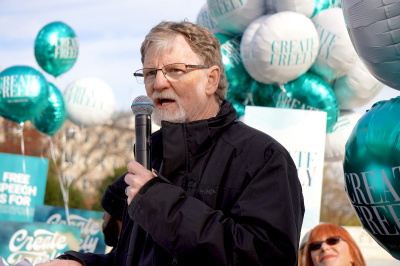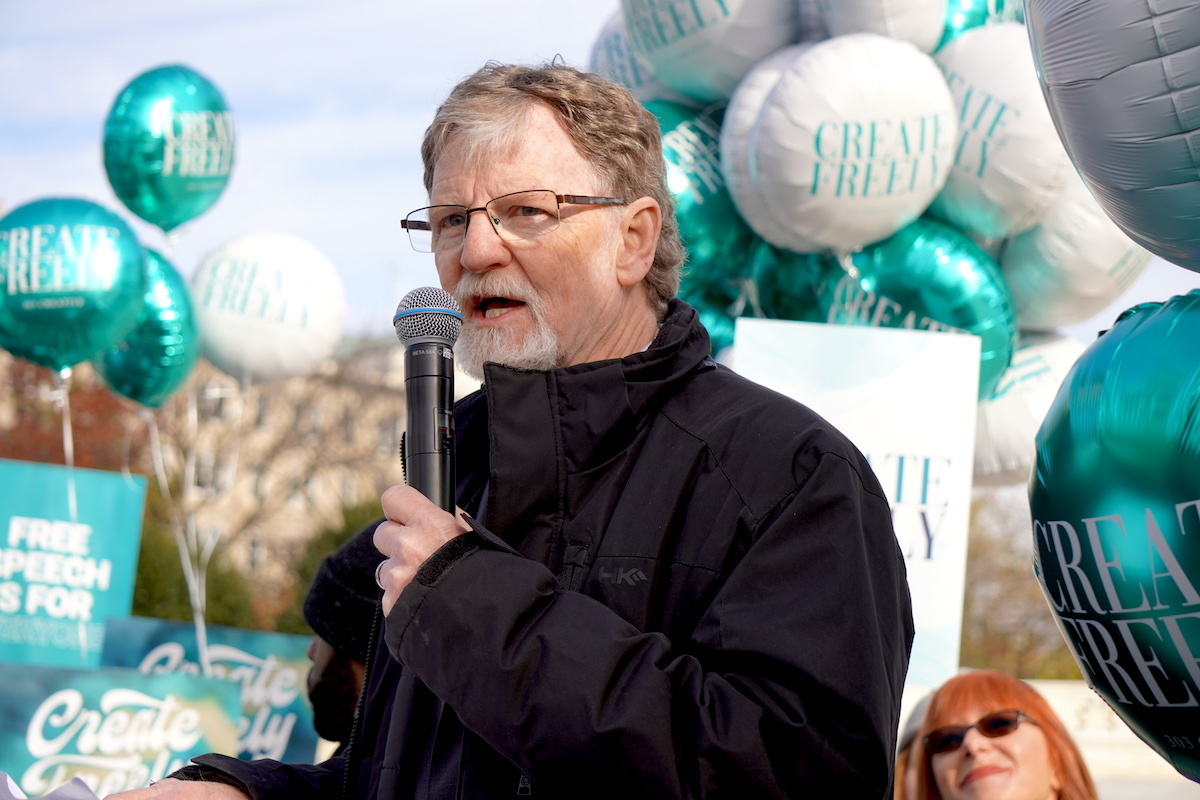
The announcement last week by the Colorado Supreme Court that its justices will hear the case of Masterpiece Cakeshop v. Scardina is music to the ears of Denver cake artist Jack Phillips, who’s hoping this will be a case of “same song, second verse.”
The “song” in question is the landmark decision issued earlier this year by the U.S. Supreme Court in another Colorado case, 303 Creative v. Elenis. The high court upheld free speech for all, blocking the state’s intent to compel a Colorado web designer to create custom websites celebrating views of marriage against her faith.
The same law challenged in that case—Colorado’s Anti-Discrimination Act—is the one activists and state officials have been misusing for 11 years to coerce Phillips to create custom cakes that celebrate ideas and communicate messages he doesn’t believe in. The first case tried to force Phillips to create a custom cake celebrating a view of marriage contrary to his beliefs and climaxed in a 2018 trip to the U.S. Supreme Court, where justices determined that a lower court ruling against Phillips was compromised by deep bias against his religious beliefs.
A second case was precipitated by a phone call from an activist attorney — on the same day the U.S. Supreme Court decided to hear Phillips’ first case — requesting that Phillips create a custom cake symbolizing and celebrating a gender transition. The same attorney then called again to request a second custom cake, this one depicting Satan smoking marijuana — to “correct the errors of [Phillips’] thinking,” the attorney said.
Phillips politely declined both requests because the cakes expressed messages contrary to his core beliefs. The attorney then filed the current lawsuit, threatening to continue harassing Phillips until he is punished. As of last January, two lower courts in Colorado have successively ruled that Phillips can be forced to create custom expression promoting ideas he doesn’t believe; since then, the 303 decision has underscored the Supreme Court’s determination to protect the free speech rights of all Americans under the First Amendment.
That ruling should mean success for Phillips in his current appeal. Because the requested cake expresses a message, it is protected speech. The plaintiff made it clear when placing the order that the custom cake — pink on the inside, blue on the outside — was intended to communicate a very specific message celebrating a gender transition.
What’s more, the trial court found that the requested cake clearly “symbolize[s]” the plaintiff’s “transition from male to female.” The blue “represents male,” while the pink “represents female”; the message is unmistakable in context. Indeed, the very idea of commissioning a custom cake, for most customers, is to communicate a specific message of celebration and approval. The trial court suggested this cake request was no exception.
Phillips’ decision on whether to create a custom cake always comes down to the message the cake will express — not the customer asking. His willingness to serve anyone has been well-documented throughout his 11-year legal battle. In fact, a longtime gay customer testified for Phillips at trial, explaining that Phillips has always served him and treated him with respect.
That commitment is consistent with Phillips’ character, as well as his right to expressive freedom. He serves people from all backgrounds but cannot create custom cakes expressing messages contrary to his beliefs — and the Constitution says he shouldn’t have to do so.
A loss at the Colorado high court would likely mean another appeal to the U.S. Supreme Court, inviting the justices to apply 303 Creative to protect Phillips’ freedom. But a win in Colorado would be a meaningful affirmation of the right of all Americans — whatever their beliefs — to express those beliefs without fear of government punishment.
It would also mean a welcome end to the more than a decade of suffering Phillips and his family have endured in pursuit of their constitutionally protected freedoms. As one of his attorneys for most of those years, I’ve watched him move through challenge after challenge with persistence and faith — always hopeful, always thankful, always looking for a way to love his neighbor and to honor his God in the face of unrelenting opposition.
His example reminds me of Paul’s words to the Corinthians: “We are hard-pressed on every side, yet not crushed; we are perplexed, but not in despair; persecuted, but not forsaken; struck down, but not destroyed.”
I hope, one day soon, the Colorado Supreme Court will announce a decision that is music to this good man’s ears … and that gives all Americans something to sing about.
Jake Warner is senior counsel with the Center for Appellate Advocacy at Alliance Defending Freedom (@ADFLegal).
Free Religious Freedom Updates
Join thousands of others to get the FREEDOM POST newsletter for free, sent twice a week from The Christian Post.




























![[Video] More – Aghogho » GospelHotspot](https://gospelhotspot.net/wp-content/uploads/2024/04/More-Aghogho.jpeg)
















